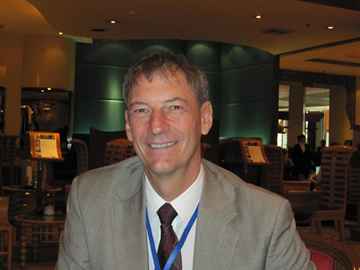Interview with Dr. Michael Green, General Manager of the Department Innovation, Industry, Science and Research, Australian Government

26 January, 2010, APRSAF-16
Could you tell us about your background?
My background is in systems engineering, and in particular control systems engineering. I have had responsibility for space licensing and safety, too, and so have some experience in areas like risk assessment and probability risk analysis, rocket launching and re-entry risk analysis. I have great interest and experience in helping with space policy issues.
Please explain the role of the Space Policy Unit.
The Space Policy Unit is relatively new, established on the 1st of July 2009, and does a number of things. We are the single point of contact for civil space issues in Australia. We recognize that finding the right place to contact in Australia has been problematic for people, so people can contact us and, if we can’t deal with it, we will identify the appropriate people who can deal with it. We have a coordinating and communicating role across the Australian Government to more closely align with space activities of various Australian government agencies. We convene a group called the Australian Government Space Forum to help share information and knowledge about what is going on in space.
We have just started a new grant program called the Australian space research program.. Round One is taking place at the moment, with applications having closed on 4th December. We are still assessing those applications and should be announcing the successful funding applications in the next month or two. We will be announcing the opening of the second round of applications in March or April. Through the program we are trying to develop Australian strategic capabilities. This will allows us to coordinate some of the non-government activities in the research sector and industry.
Also, significantly, we have been asked to develop a national space policy for Australia. It is going to be quite a challenging role. Australia has had articulated a variety of policy frameworks before but this is a new opportunity to shape space strategy for Australia and we are very proud of that.
What is the focus of space activities in Australia?
The Australian government had a Senate inquiry into the state of Australia’s space science and industry sector in 2008. This inquiry made a number of recommendations. One of its recommendations was that the focus of Australian space activities and policy should largely be around what we call the “work-horse” applications to communications, to earth observation, and to position, navigation and timing. The government has agreed with that we set those as the primary focus of our space policy. So, we are very much looking to better coordinate, to better engage internationally, and to better harness and develop policies to ensure we’re well positioned to take advantage of participating in those areas: communications, earth observation and position, navigation and timing applications.
What do you think about international cooperation within the framework of APRSAF?
We see APRSAF as an important forum for cooperating in dialog on space issues in the Asia-Pacific region. We very much want to support and promote it as a means to exchange views and cooperate. Australia has a long, deep and comprehensive bilateral relationship on many issues with the United States, and has some ongoing historical connections with European initiatives and the ESA. We also coordinate closely with friends in the Asia-Pacific region, for example with JAXA and the Japan Meteorological Organization. Australia’s primary weather satellite data comes from Japanese weather satellites. We very much look forward to maintaining, developing, and contributing to the Asia-Pacific dialog, with our capabilities in regionally supporting a part of the world which is not, I guess, a major focus of European or American initiatives. Hence, we are looking forward to being a more significant contributor, along with JAXA and other Asia-Pacific countries, to how space can contribute to capabilities, applications, and to supporting activities such as forest monitoring, disaster warning systems, carbon accounting, and also to general technology cooperation, research cooperation, and good relationships with each other in the region.
Do you have any ideas regarding establishing new Working Groups/ Initiatives in APRSAF?
I think the working groups cover a fairly broad area already. I don’t have any suggestions for new working groups at the moment. I am looking forward to seeing activities proceeding more closely while I’m here at APRSAF-16. We will probably make some suggestions about focusing on activities within working groups rather than forming new working groups. One thing that we might think about is whether the position, navigation and timing, and space system applications have an adequate voice in current working groups, as I feel there has been significant growth in those applications in the last 10 years. We need further opportunities to talk about such matters. I know Japan has its Quasi-Zenith Satellite System, a regional GPS that is under development. We may want to have discussions concerning this kind of regional GPS or other initiatives in that area. That’s one of the things I’m considering.